Tightrope
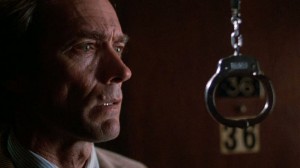 There’s nothing more menacing than a serial killer into S&M who completes the picture by wearing a stolen pair of Mr. Rogers’ sneakers*. Ok, maybe I’m just making up that last part. There’s no reason to think he stole the shoes, Mr. Rogers might have lent them out to him.
There’s nothing more menacing than a serial killer into S&M who completes the picture by wearing a stolen pair of Mr. Rogers’ sneakers*. Ok, maybe I’m just making up that last part. There’s no reason to think he stole the shoes, Mr. Rogers might have lent them out to him.
Anyway, 1984’s tawdry Tightrope, a Clint Eastwood police procedural that, by the standards of today, with even studios making movies like 8MM, is quite quaint. Obviously Clint intended Tightrope as a departure from his Dirty Harry roles. The fourth in that series, Sudden Impact, had been released only a year earlier. This, because the close-mindedness and homophobia that is standard for Harry, where just being a lesbian is reason enough to take a beating, has been replaced by Wes Block, a cop into handcuffing prostitutes and having sex with them. When Wes is challenged that he might try sleeping with young boys, he replies to the goading gigolo, “Maybe I have.”
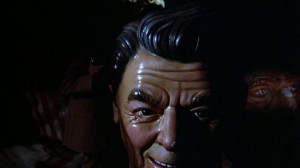 These sorts of diversions overcome the standard killer stuff, where Clint and the mystery man have similar interests. And so the suspicion falls on Wes, which carries no tension at all, because the killer’s identity was revealed in the very first scene. Perhaps as compensation for the lack of surprise, the movie throws in all sorts of goofiness, at least guaranteeing that Tightrope won’t be completely forgettable. Whether it be his young daughter’s questions about erections or when one of the victims is found rotating in the washing machine, visible through the window, or the amusement park size heads of famous politicians hidden in a warehouse, or the brilliant final confrontational moment (after a dull and endless chase sequence who’s only purpose seems to be to fulfill Clint’s motif of having his characters always running), Tightrope is always trying to make sure you’re awake.
These sorts of diversions overcome the standard killer stuff, where Clint and the mystery man have similar interests. And so the suspicion falls on Wes, which carries no tension at all, because the killer’s identity was revealed in the very first scene. Perhaps as compensation for the lack of surprise, the movie throws in all sorts of goofiness, at least guaranteeing that Tightrope won’t be completely forgettable. Whether it be his young daughter’s questions about erections or when one of the victims is found rotating in the washing machine, visible through the window, or the amusement park size heads of famous politicians hidden in a warehouse, or the brilliant final confrontational moment (after a dull and endless chase sequence who’s only purpose seems to be to fulfill Clint’s motif of having his characters always running), Tightrope is always trying to make sure you’re awake.
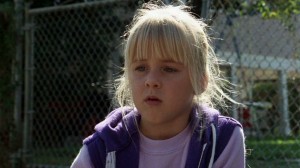 Director Richard Tuggle (reportedly in-name-only as Clint did most of the actual directing) tries to keep the movie very low-key, partially by turning into a travelogue of the seedier parts of New Orleans. These are dealt with in a matter-of-fact way. As is the refreshing handling of Wes’ relationship with a rape counselor played by Geneviève Bujold. While it is clear they will eventually get together, there’s an actual development in their relationship — not just the immediate antagonism transforming into sex — meaning that Bujold has the rare female role in an Eastwood film that isn’t totally thankless and perfunctory.
Director Richard Tuggle (reportedly in-name-only as Clint did most of the actual directing) tries to keep the movie very low-key, partially by turning into a travelogue of the seedier parts of New Orleans. These are dealt with in a matter-of-fact way. As is the refreshing handling of Wes’ relationship with a rape counselor played by Geneviève Bujold. While it is clear they will eventually get together, there’s an actual development in their relationship — not just the immediate antagonism transforming into sex — meaning that Bujold has the rare female role in an Eastwood film that isn’t totally thankless and perfunctory.
Especially well done are the scenes where he tries to flirt with her to create a staccato banter, and Tuggle/Eastwood lets his quips that he thinks are clever just die. You can see how his awkward, cocky charm might have worked on her, building on their initial platonic innuendo (“I’ll take you bowling.” “I don’t like bowling.” “Me neither.”). It helps the viewer get past the stacking of the deck by having Wes Block be a single father whose wife left him with two adorable blond moppets to run off with her rich boyfriend (it sure makes sense to leave your kids with your cop ex-husband who’s never home). The children are obviously there as juxtaposition to Wes’ lascivious interests. But it only provides groans, not just because the younger looks exactly like the Poltergeist kid. But it gives the killer someone to kidnap and/or attack when Wes is out of the house trying to find him.
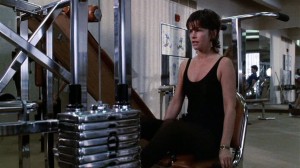 And while there are plenty of other clichés, dated or otherwise (check out that nerd masseuse!), there’s also a midget refereeing two women wrestling in oil. It kind of makes me wish that he’d taken a similar approach to spicing up his adaptation of The Bridges of Madison County.
And while there are plenty of other clichés, dated or otherwise (check out that nerd masseuse!), there’s also a midget refereeing two women wrestling in oil. It kind of makes me wish that he’d taken a similar approach to spicing up his adaptation of The Bridges of Madison County.
Think about it. Clint. Meryl. Midgets.
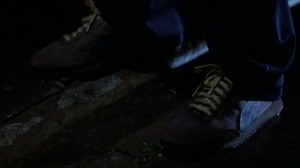
* The walking instruments in question



